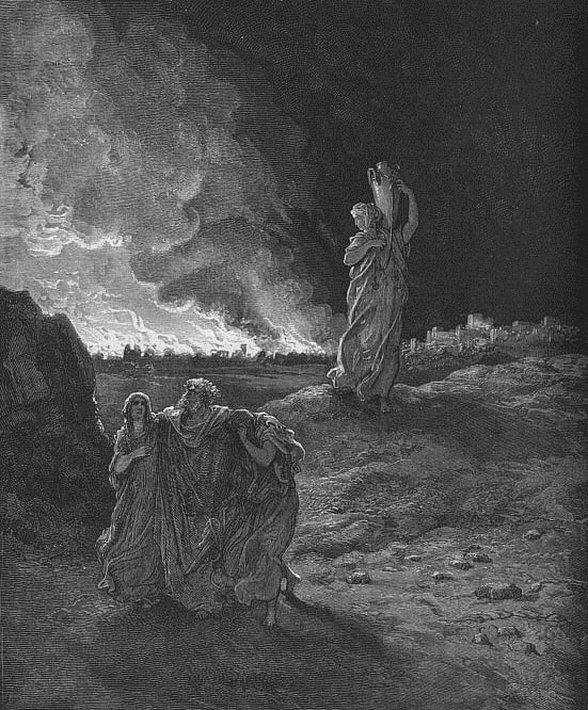|
17/7/2017 0 Comments Lot's Wife I was very young when I first encountered the story of Lot’s wife, accompanied by a woodcut slightly similar to the Gustave Doré engraving above. Across the passage of many years, I can see that black and white picture with astonishing clarity. In the foreground Lot and his daughters are hurrying upward, away from the sulphurous blast which is laying waste the landscape behind them. The entire background is occupied by blinding sheets of light, suggesting the cataclysm taking place below. Most chilling of all to my child’s eye, however, was the still grey figure of Lot’s wife, in the centre of the picture. Even as her upper body is in the act of turning, her feet are already frozen forever. It was a shocking evocation of instantaneous, brutal retribution. As I became more familiar with the story in later years, my puzzlement intensified. Lot’s wife’s offence seems to pale in comparison with the activities of her deeply unpleasant husband. Yet he is spared, to commit further disgraceful acts. What was so terrible about his wife disobeying a command not to look back? When I first saw the picture, I couldn’t understand why Lot’s wife would have wanted to turn back in the first place. But then, at that time of my life, I was untouched by the force field of the past. Forty years or so later, my perspective has changed. I now understand – through my own experience and that of others - what it can be to be imprisoned by the past. The shackles can take many forms - nostalgia, remorse, resentment, an overwhelming attachment to things and places. The past is so safe – a finite thing, defined in space and time, containing no surprises. It is like an old shoe – it may not be ideal for a long journey, but it slips on easily and requires no breaking in. How often do we seek security rather than fulfilment? How often are we frozen between where we have been and where we should go? As Lot and his family flee the cataclysmic upheaval in Sodom, “Lot’s wife behind him looked back, and she became a pillar of salt”. Why the terrible fate? She looked back. This is reinforced by the context in which Christ refers to her. As described by Luke, the Pharisees have raised the question about the coming of the kingdom of God and he answers them briefly. Then he turns to his own followers and elaborates: And he said to his disciples…on the day when Lot went out from Sodom fire and sulphur rained from heaven and destroyed them all – so will it be on the day when the Son of Man is revealed. On that day, let him who is on the housetop, with his goods in the house, not come down to take them away; and likewise let him who is in the field not turn back. Remember Lot’s wife. Whoever seeks to gain his life will lose it, but whoever loses his life will preserve it. [1] The downfall of Lot’s wife, then, was in her refusal to believe that this – for her – was the day of salvation. When Christ speaks of the desire to save one’s life, he is speaking of a desire to preserve our own definition of life. Very often, we see life in terms of who we are, what we do and what we possess. Our energies go into preserving the illusion of control over all of this. To “lose” this life is to relinquish control, to allow ourselves, in the words of the 12th century Hildegard of Bingen, to be “blown like a feather on the breath of God”. Lot’s wife was unable to trust herself to trust God. In seeking to hold on to her life as she knows it, she lost everything. Lot’s wife couldn’t move forward because of the pull of the past. She couldn’t even move back. And many of us have been Lot’s wife too – frozen into immobility. I have been on the housetop when the Lord gave a warning I could not fail to hear, and yet I turned back into the house despite the warning to leave everything. What is it that pulls me back into the house? What is it that lets me hear the call of God and still linger? How many times have I put my hand to the plough and still turned back? The door through which the Lord calls me is always open, but on my last day on earth it will close forever. Which side of the door will I be on then? [1] Luke 17:22, 29-33 Helen is part of the team at New Pilgrim Path.
0 Comments
|
 RSS Feed
RSS Feed